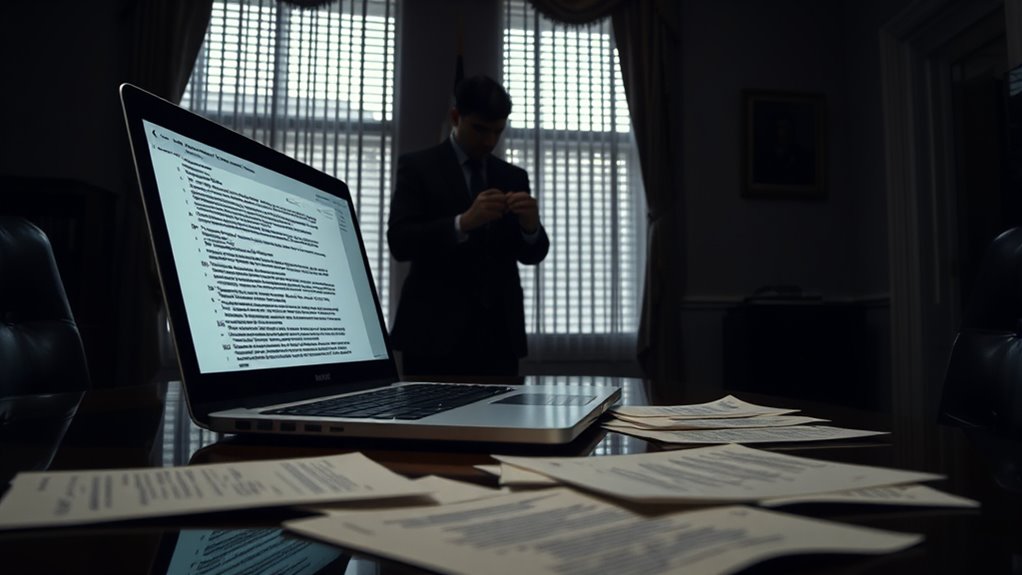The CIA's email blunder has exposed the names of probationary officers, creating serious national security risks. This incident, spurred by directives from Trump's administration, raises questions about why such sensitive information was shared unclassified. The leak could compromise ongoing operations and put U.S. spies in jeopardy. Moreover, it risks damaging recruitment and morale within the agency. To understand the full implications of this fiasco, there's more to uncover about the reactions and consequences.
Key Takeaways
- An unclassified CIA email revealed names of probationary officers, raising serious security concerns about counterintelligence breaches.
- Sharing sensitive information through unclassified channels exposes CIA operations and risks compromising U.S. spies' identities.
- The White House mandated the unclassified format for the email, raising questions about the Trump administration's impact on CIA operations.
- The breach may deter future recruits and lead to early retirements among experienced officers, weakening CIA's operational capacity.
- Public criticism has focused on the need for stricter data protection policies to prevent similar intelligence leaks in the future.

In a troubling turn of events, the CIA's decision to send an unclassified email detailing recent hires to the White House has raised significant concerns about national security. This directive, stemming from an executive order aimed at federal workforce management, included names and initials of probationary officers, many of whom focus on intelligence operations concerning China. The implications of this email are alarming; former officials warn that this blunder could lead to serious counterintelligence breaches.
By sharing this information via an unclassified email, the CIA inadvertently opened the door for foreign agencies, particularly those from China, to cross-reference publicly available data with the names listed. You can imagine how easily this could compromise CIA operations. The risk isn't just theoretical; it's a tangible threat that has left many in the intelligence community feeling vulnerable. Former officials have described the situation as a "counterintelligence disaster," highlighting the potential for exposing U.S. spies and assets.
The CIA's unclassified email risks exposing U.S. spies, marking a significant counterintelligence disaster with alarming implications.
The White House's insistence on receiving this list in an unclassified format raises questions about their motivations. It seems that the Trump administration's approach to reshaping the CIA has detrimental effects on the agency's operations. You might find it unsettling that even Elon Musk's government efficiency team is involved, adding layers of complexity to data access and privacy. The involvement of Musk's team has heightened concerns over the implications of private sector involvement in intelligence matters.
The scrutiny surrounding the White House's role in managing sensitive CIA personnel data could have serious long-term effects. The operational impact of this leak can't be overstated. You may wonder how such a breach could deter future recruits who are understandably wary about their safety. Moreover, experienced officers are feeling pressured to retire early, which could weaken the CIA's operational depth.
The agency's effectiveness in conducting intelligence operations is now at risk, potentially compromising national security. The morale of CIA personnel and their recruitment efforts could suffer lasting damage from this incident. Public and media reactions have been swift, with widespread criticism directed at the Trump administration for its handling of sensitive information.
Comparisons are being drawn to previous intelligence breaches, further damaging public perception of the CIA's security measures. Legal experts are now scrutinizing the executive order that led to this email directive, raising important questions about the future of data protection policies within government agencies. The implications of this incident may lead to calls for stricter protocols to prevent similar situations from occurring again.
Frequently Asked Questions
What Specific Measures Is the C.I.A. Taking to Prevent Future Leaks?
To prevent future leaks, the C.I.A. is implementing stringent access controls and enhancing biometric verification for sensitive data.
You'll notice they're also creating detailed audit trails and using automated monitoring to detect suspicious activities.
Regular training programs on security protocols are mandatory for employees, and incident response plans are being developed.
They're focusing on a cultural shift towards security awareness, ensuring everyone understands their role in safeguarding classified information.
How Has This Incident Affected the C.I.A.'S Operations and Employee Morale?
This incident has significantly impacted the CIA's operations and employee morale.
You might notice a heightened sense of fear among employees, worrying about exposure and safety. Trust in the agency's ability to protect personnel has eroded, leading to decreased job satisfaction.
Operationally, the CIA may need to adapt by reassigning compromised agents, which could disrupt ongoing missions.
What Are the Legal Ramifications for Those Involved in the Email Blunder?
"Loose lips sink ships," and in this case, they could lead to serious legal ramifications.
You might face charges under the Espionage Act or the Intelligence Identities Protection Act for leaking classified information. However, proving specific intent is tough, making prosecution rare.
Without general penalties for unauthorized disclosures, accountability remains weak. Still, the potential for internal investigations looms, as both government officials and journalists could be scrutinized for their roles in the blunder.
Has the Trump Team Been Directly Implicated in Exploiting the Leaked Information?
You might wonder if the Trump team has been directly implicated in exploiting the leaked information from the CIA.
As of now, there's no concrete evidence suggesting they used the leaked employee names for any specific gains.
However, the potential for future exploitation remains a concern.
The situation highlights the risks associated with mishandling sensitive data, and it's crucial to monitor how this incident evolves in terms of security implications.
What Protocols Exist for Managing Sensitive Employee Information Within Intelligence Agencies?
Imagine a vault, fortified and secure, where sensitive employee information is kept under lock and key.
Intelligence agencies manage this data through strict protocols, including comprehensive background checks, continuous evaluations, and training for handling classified information. They use encryption to guard against prying eyes, alongside audit trails to monitor access.
Compliance with regulatory frameworks ensures that every piece of information remains protected, maintaining the integrity of those working in the shadows of national security.
Conclusion
In this colossal C.I.A. fiasco, you've just witnessed a blunder so monumental that it could rival the fall of empires! Leaked employee names are swirling in the digital ether like confetti at a parade, and the Trump team is sitting on a goldmine of intel. It's as if a piñata burst open, showering secrets everywhere! If this isn't a wake-up call for tighter security, I don't know what is. The stakes have never been higher, and the clock's ticking!









